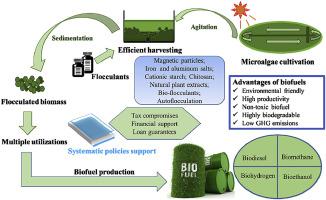Renewable and Sustainable Energy Reviews ( IF 16.3 ) Pub Date : 2020-06-26 , DOI: 10.1016/j.rser.2020.110005 Shuangxi Li , Tianyi Hu , Yanzhe Xu , Jingyi Wang , Ruoyu Chu , Zhihong Yin , Fan Mo , Liandong Zhu

|
The energy demands and costs of harvesting microalgal biomass make it unrealistic and unsustainable for economically feasible microalgal biofuel production. Therefore, meticulous exploration of the harvesting processes is essential to identify appropriate harvesting techniques for potentially commercialized microalgal biodiesel production. Flocculation may be a superior method when considering harvesting efficiency, economic cost, energy consumption and technical feasibility. This review sheds some light on the recent progresses of physical/chemical flocculation and bioflocculation applied in the microalgal biomass harvesting processes. Physical flocculation techniques are energy-intensive and require special equipment, creating the cost barrier for microalgal biomass harvesting. Magnetic particle flocculation is much more efficient and is also recyclable. In contrast, chemical flocculation that involves the application of organic and inorganic flocculants, is now in the limelight. The microalgae species applied, the dosages of flocculants as well as flocculation recovery efficiencies are compared and presented in detail in this review. In addition, bioflocculation as a harvesting techniques is critically described, in particular the mechanisms of autoflocculation, a promising bioflocculation by co-cultivation of microalgae with microorganisms, are explored. This review also disclosed the effects of flocculant application on downstream processes, especially when chemical flocculants are applied. This review intends to provide guidance for the long-term adoption of these economically beneficial mature flocculation recovery technologies in the biofuel industry. Despite of considerable progress, key challenges such as further reduction of costs and the minimization of downstream product pollution risks in conventional and advanced harvesting techniques, must be addressed. This article also suggests the directions for future research in microalgae harvesting and argues that the production of microalgae biofuels under potential policy intervention should be carried out in a healthy and sustainable way.
中文翻译:

絮凝作为一种收集能量微藻的有效方法的综述:机理,性能,影响因素和观点
收获微藻生物质的能量需求和成本使其对于经济上可行的微藻生物燃料生产来说是不现实和不可持续的。因此,对收获过程的细致探索对于确定潜在的商业化微藻生物柴油生产合适的收获技术至关重要。考虑到收获效率,经济成本,能耗和技术可行性,絮凝法可能是一种更好的方法。这项审查揭示了物理/化学絮凝和生物絮凝技术在微藻类生物质收获过程中应用的最新进展。物理絮凝技术耗能大,需要专用设备,为微藻生物质的收获创造了成本壁垒。磁性颗粒絮凝效率更高,并且可以回收。相比之下,涉及有机和无机絮凝剂应用的化学絮凝法现在备受关注。比较并详细介绍了所应用的微藻种类,絮凝剂的用量以及絮凝回收效率。另外,关键地描述了生物絮凝作为一种收获技术,特别是自动絮凝的机理,探索了通过将微藻类与微生物共培养的有前途的生物絮凝。该综述还公开了絮凝剂施加对下游工艺的影响,特别是在施加化学絮凝剂时。这篇综述旨在为在生物燃料行业中长期采用这些经济上有利的成熟絮凝回收技术提供指导。尽管取得了长足的进步,但仍必须应对关键挑战,例如进一步降低成本以及将常规和先进的收获技术中的下游产品污染风险降至最低。本文还提出了微藻收获的未来研究方向,并提出在潜在政策干预下生产微藻生物燃料应以健康和可持续的方式进行。必须解决。本文还提出了微藻收获的未来研究方向,并提出在潜在政策干预下生产微藻生物燃料应以健康和可持续的方式进行。必须解决。本文还提出了微藻收获的未来研究方向,并提出在潜在政策干预下生产微藻生物燃料应以健康和可持续的方式进行。











































 京公网安备 11010802027423号
京公网安备 11010802027423号